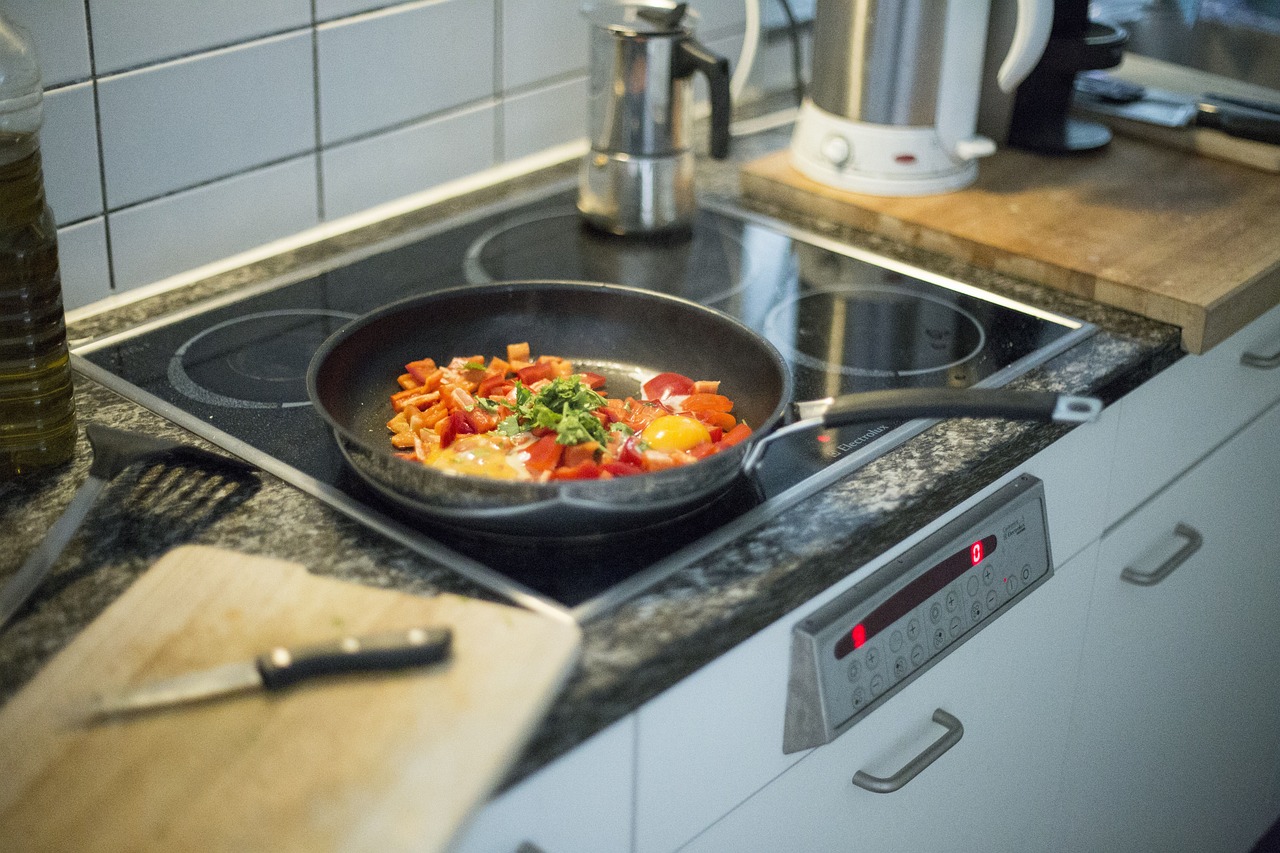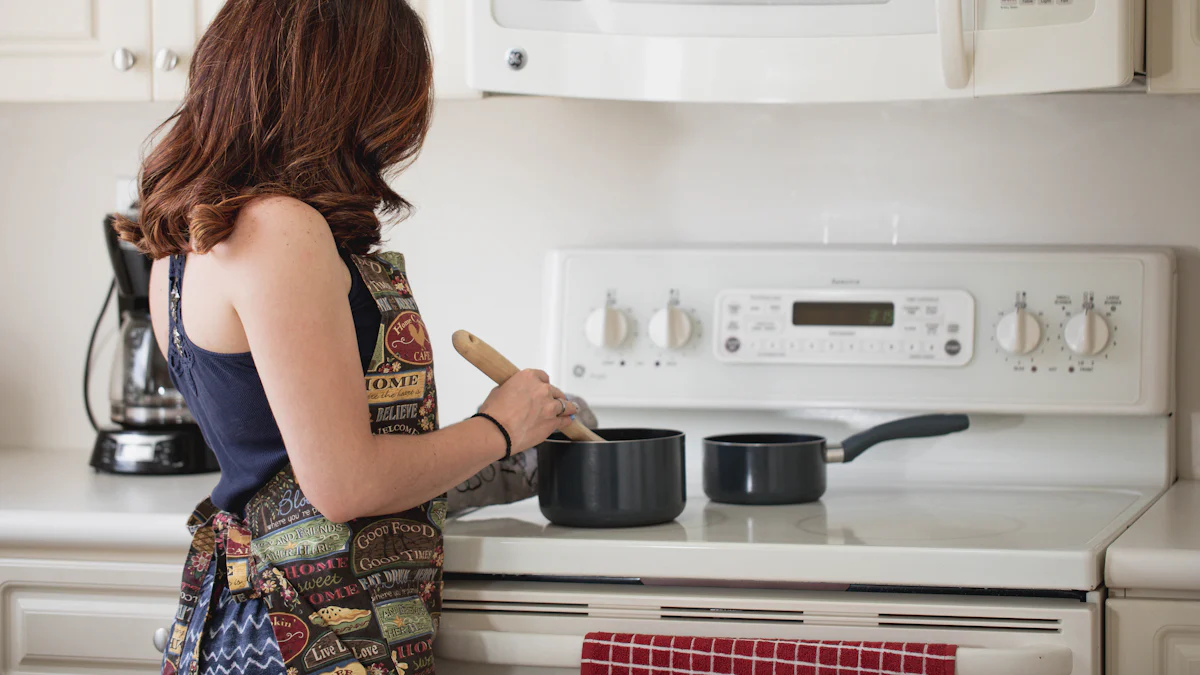Discover the Eco-Friendly Benefits of Induction Cooktops

Imagine cooking with a method that's not only efficient but also kind to the planet. Induction cooktops offer just that. They directly heat your cookware, making them up to 15% more efficient than standard electric stoves and nearly three times more efficient than gas stoves. This means less wasted energy and a cooler kitchen. Plus, they provide a safer cooking environment with no open flames and a surface that stays cool to the touch. You also enjoy health benefits, as induction cooktops improve indoor air quality by reducing emissions. And while the initial investment might seem high, the long-term savings on energy bills make it worthwhile.
Key Takeaways
Induction cooktops are up to 15% more energy-efficient than electric stoves and nearly three times more efficient than gas stoves, leading to lower energy bills.
They heat cookware directly using electromagnetic energy, which means faster cooking times—20-40% quicker than traditional methods—saving you time in the kitchen.
Safety is enhanced with features like a cool-to-touch surface and automatic shut-off, reducing the risk of burns and fires, making them ideal for homes with children or pets.
Induction cooking improves indoor air quality by eliminating harmful combustion byproducts, contributing to a healthier home environment.
Precise temperature control allows for better cooking results, helping to retain nutrients in your food and ensuring meals are cooked evenly.
While the initial investment may be higher, the long-term savings on energy costs and the benefits to health and safety make induction cooktops a smart choice.
Transitioning to induction cooking may require compatible cookware, but many affordable options are available to ease the switch.
Energy Efficiency of Induction Cooktops
When you think about cooking, you might not immediately consider how much energy your stove uses. But with an induction cooktop, you can enjoy a more energy-efficient cooking experience. Let's dive into how these cooktops save energy and how they stack up against traditional methods.
How Induction Cooktops Save Energy
Direct Heating Mechanism
Induction cooking uses a unique method to heat your pots and pans. Instead of heating the air around the cookware, it uses electromagnetic energy to heat the cookware directly. This means that nearly 85% of the electrical energy gets converted into heat in the cookware itself. You waste less energy, and your kitchen stays cooler. This direct heating mechanism makes induction cooktops a smart choice for those looking to reduce energy consumption.
Faster Cooking Times
Time is precious, and induction cooktops help you save it. They can bring a pot of water to a boil 20-40% faster than gas or conventional electric cooktops. This speed not only saves you time but also reduces the amount of energy used during cooking. Faster cooking times mean you spend less time in the kitchen and more time enjoying your meals.
Comparison with Traditional Cooking Methods
Gas vs. Induction
Gas stoves have been a staple in many kitchens, but they aren't the most efficient. Only about 35-40% of the energy from gas gets converted into heat for cooking. In contrast, induction ranges are nearly three times more efficient. They produce fewer emissions, making them a cleaner option for your home. If you're looking to cut down on energy bills and reduce your carbon footprint, switching to an induction range could be a wise move.
Electric vs. Induction
Standard electric cooktops are more efficient than gas, but they still fall short compared to induction cooking. Induction cooktops are about 5-10% more efficient than conventional electric stoves. This efficiency translates to lower energy costs and a more sustainable kitchen. Plus, with induction, you get the added benefit of precise temperature control, which can enhance your cooking experience.
By choosing an induction cooktop, you not only embrace energy efficiency but also contribute to a healthier planet. It's a win-win for both you and the environment.
Safety Features of Induction Cooktops

When it comes to cooking, safety is a top priority. Induction cooktops offer several features that make them a safer choice for your kitchen.
Reduced Risk of Burns
Cool-to-Touch Surface
One of the standout features of induction cooktops is their cool-to-touch surface. Unlike traditional stoves, the heat is generated directly in the cookware, not on the cooktop itself. This means the surface remains relatively cool, even when you're cooking. If you accidentally touch the cooktop, you're less likely to get burned. This feature is especially beneficial in homes with young children or pets who might wander into the kitchen.
Automatic Shut-Off
Induction cooktops come equipped with an automatic shut-off feature. If you remove the cookware from the cooktop, it automatically turns off. This prevents the cooktop from staying on accidentally, reducing the risk of burns or fires. It's a smart safety measure that gives you peace of mind, knowing that your kitchen is a safer place.
Child Safety Considerations
Lock Features
For families with children, induction cooktops offer additional safety features like child locks. These locks prevent little hands from accidentally turning on the cooktop. You can cook with confidence, knowing that your kids are safe from potential hazards.
Lack of Open Flames
Induction cooktops don't use open flames, unlike gas stoves. This significantly reduces the risk of fire and burns. Without flames, there's no need to worry about flammable items catching fire. You can leave a dish towel or spatula on the cooktop without fear of them getting damaged or causing a fire. This makes induction cooktops a great choice for households with young children or pets.
Incorporating these safety features into your kitchen not only protects your family but also enhances your cooking experience. With induction cooktops, you can enjoy a safer, more efficient way to prepare meals.
Health Benefits of Induction Cooktops
Cooking isn't just about making delicious meals; it's also about creating a healthy environment in your home. Induction cooktops offer several health benefits that can enhance your cooking experience and improve your indoor air quality.
Improved Indoor Air Quality
When you cook with an induction cooktop, you contribute to a cleaner and healthier home environment.
No Combustion Byproducts
Unlike gas stoves, induction cooking doesn't produce combustion byproducts. Gas stoves can release harmful pollutants like nitrogen dioxide and carbon monoxide, which can affect your indoor air quality. With induction, you eliminate these risks. The absence of combustion byproducts means you breathe cleaner air while you cook.
Reduced Emissions
Induction cooktops significantly reduce emissions compared to traditional cooking methods. They don't emit greenhouse gases or other pollutants, even when turned off. This reduction in emissions contributes to a healthier home and a more sustainable planet. You can cook with peace of mind, knowing you're making a positive impact on the environment.
Precision Cooking for Healthier Meals
Induction cooking offers precise control over temperature, allowing you to prepare healthier meals with ease.
Temperature Control
One of the standout features of induction cooktops is their precise temperature control. You can adjust the heat instantly, ensuring your food cooks evenly and at the right temperature. This precision helps you avoid overcooking or burning your meals, preserving their nutritional value and flavor.
Nutrient Retention
Cooking with an induction cooktop can help retain more nutrients in your food. The quick and even heating allows you to cook meals faster, reducing the time your food is exposed to heat. This means more vitamins and minerals stay intact, providing you with healthier meals. You enjoy the full nutritional benefits of your ingredients, making induction cooking a smart choice for health-conscious individuals.
By choosing an induction cooktop, you not only improve your indoor air quality but also enhance the nutritional value of your meals. It's a win-win for your health and the environment.
Cost Considerations of Induction Cooktops
Switching to an induction cooktop can feel like a big decision, especially when you consider the costs involved. But don't worry, let's break it down and see how this investment can pay off in the long run.
Initial Investment vs. Long-Term Savings
Upfront Costs
When you first look at induction cooktops, the price tag might catch your eye. They often cost more upfront compared to traditional gas or electric stoves. This is because of the advanced technology and materials used in their design. However, think of it as an investment in your kitchen's future. You're paying for a high-end appliance that offers unmatched energy efficiency and safety features.
Energy Bill Savings
Now, let's talk about savings. Induction cooktops are incredibly efficient. They convert about 85% to 95% of the energy they consume directly into heat for cooking. This efficiency means you'll likely see a decrease in your energy bills over time. While the initial cost might be higher, the savings on your monthly bills can help offset this expense. Over the years, these savings add up, making the induction range a cost-effective choice.
Cookware Compatibility
Before you make the switch, it's important to consider the type of cookware you'll need.
Necessary Cookware Types
Induction cooktops require specific types of cookware. They work best with pots and pans made from ferrous metals like cast iron or stainless steel. If a magnet sticks to the bottom of your cookware, it's compatible with induction. You might need to invest in new cookware if your current set doesn't meet these requirements.
Transitioning Tips
Transitioning to an induction cooktop doesn't have to be daunting. Start by checking your existing cookware with a magnet. If you need new pieces, look for sets labeled as induction-compatible. Many brands offer affordable options that work perfectly with induction ranges. Consider buying a few essential pieces first, like a frying pan and a saucepan, to ease the transition.
By understanding the costs and making informed choices, you can enjoy the benefits of an induction cooktop without breaking the bank. It's a smart move for both your wallet and the environment.
Induction cooktops offer a remarkable blend of energy efficiency, safety, and health benefits. By choosing an induction cooktop, you embrace a sustainable kitchen solution that reduces energy consumption and enhances cooking precision. These cooktops not only save energy but also provide a safer cooking environment with no open flames and improved indoor air quality. Consider making the switch to induction for long-term advantages that benefit both the environment and your personal health. It's a smart choice for a greener, healthier lifestyle.
FAQ
What is an induction cooktop and how does it work?
An induction cooktop is a unique type of electric cooktop. It uses electromagnetic coils beneath the glass surface to transfer magnetic energy into the metal at the base of your cookware. This energy then converts into heat. This method is more efficient, faster, and easier to control than traditional electric cooktops.
What are the benefits of induction cooktops?
Induction cooktops offer several advantages. They provide faster cooking times, better heat control, and greater safety compared to traditional electric cooktops. You can enjoy a safer cooking experience because the electromagnetic field has a short range and automatically shuts off when you remove the cookware.
Are induction cooktops energy-efficient?
Yes, induction cooktops are highly energy-efficient. They use less energy, cook with more precision, and heat up faster than traditional gas or electric cooktops. They can be up to 90% efficient, resulting in minimal heat loss.
Do I need special cookware for induction cooktops?
Yes, you need specific types of cookware for induction cooktops. They work best with pots and pans made from ferrous metals like cast iron or stainless steel. To check compatibility, see if a magnet sticks to the bottom of your cookware. If it does, you're good to go!
How do induction cooktops improve indoor air quality?
Induction cooktops improve indoor air quality by eliminating combustion byproducts. Unlike gas stoves, they don't release harmful pollutants like nitrogen dioxide and carbon monoxide. This means you breathe cleaner air while cooking.
Are induction cooktops safe for homes with children?
Absolutely! Induction cooktops are safer for homes with children. They have a cool-to-touch surface and lack open flames, reducing the risk of burns and fires. Many models also include child lock features to prevent accidental activation.
How do induction cooktops save time in the kitchen?
Induction cooktops save time by heating up faster than traditional methods. They can bring a pot of water to a boil 20-40% quicker than gas or conventional electric cooktops. This speed means you spend less time cooking and more time enjoying your meals.
Can induction cooktops help me cook healthier meals?
Yes, induction cooktops can help you cook healthier meals. They offer precise temperature control, allowing you to cook food evenly and at the right temperature. This precision helps preserve the nutritional value and flavor of your meals.
What should I consider before buying an induction cooktop?
Before buying an induction cooktop, consider the initial investment and cookware compatibility. While they may cost more upfront, the long-term savings on energy bills can offset this expense. Also, ensure your cookware is compatible or plan to invest in new pieces.
How do induction cooktops contribute to a sustainable lifestyle?
Induction cooktops contribute to a sustainable lifestyle by reducing energy consumption and emissions. They are more efficient than traditional cooking methods, helping you lower your carbon footprint and make a positive impact on the environment.
See Also
Enhance Your Culinary Skills Using Portable Induction Cookers
Solo Induction Cooktops: An Intelligent Kitchen Enhancement
Innovations in Induction Cooktops Featuring Integrated Downdrafts
Grasping the Functionality of Induction Cooktops
Essential Information on Induction Cooktops with Downdraft Features

